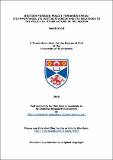Files in this item
British foreign policy towards Syria : its importance, its distinctiveness and its relations to the policy of other actors in the region
Item metadata
| dc.contributor.advisor | Hinnebusch, Raymond A. | |
| dc.contributor.author | Scott, Sarah | |
| dc.coverage.spatial | vii, 466 p. | en_US |
| dc.date.accessioned | 2016-11-30T09:19:35Z | |
| dc.date.available | 2016-11-30T09:19:35Z | |
| dc.date.issued | 2016 | |
| dc.identifier.uri | https://hdl.handle.net/10023/9903 | |
| dc.description.abstract | This thesis explores the dynamics involved in shaping the Anglo-Syrian relationship. It argues that to understand UK relations towards Syria over the past century, they have to be viewed in the broader context of British policy on Middle East regional issues, and wider foreign policy priorities. With no direct interests invested in Syria, it is both Britain’s continued involvement in Middle East affairs and Syria’s standing as a key regional power that assures a continuing relationship. Consequently, the stance of leading UK politicians on the issues of post-World War regional order, international terrorism, military interventionism, arms sales, dictatorship and democratisation have circumscribed UK policy options in relation to Syria. Using the tools of Neoclassical realism this study considers British foreign policy behaviour, in terms of Britain’s attempt to mobilize the power to protect its interests. It reviews Britain’s international behaviour in part by how it is affected by changes in the international system, as Britain has declined from being a great imperial power, to a European power. Alliances are a key tool Britain has used to manage its decline, and this study identifies the impact that this has had on Anglo-Syrian relations with particular reference to the US and EU. Finally, it demonstrates that understanding how the foreign policy process works in Britain is key to understanding its international behaviour. In this it takes into account elite perceptions both of what these interests are and how best Britain can achieve them. This adds a layer of understanding as to why foreign policy outcomes do not always conform with what would be predicted purely in terms of the pursuit of the national interest. | en_US |
| dc.language.iso | en | en_US |
| dc.publisher | University of St Andrews | |
| dc.subject.lcc | DA47.9S95S3 | |
| dc.subject.lcsh | Great Britain--Foreign relations--Syria | en |
| dc.subject.lcsh | Great Britain--Foreign relations--Middle East | en |
| dc.subject.lcsh | Syria--Foreign relations--Great Britain | en |
| dc.subject.lcsh | Syria--Politics and government | en |
| dc.subject.lcsh | Political realism | en |
| dc.title | British foreign policy towards Syria : its importance, its distinctiveness and its relations to the policy of other actors in the region | en_US |
| dc.type | Thesis | en_US |
| dc.type.qualificationlevel | Doctoral | en_US |
| dc.type.qualificationname | PhD Doctor of Philosophy | en_US |
| dc.publisher.institution | The University of St Andrews | en_US |
This item appears in the following Collection(s)
Items in the St Andrews Research Repository are protected by copyright, with all rights reserved, unless otherwise indicated.

